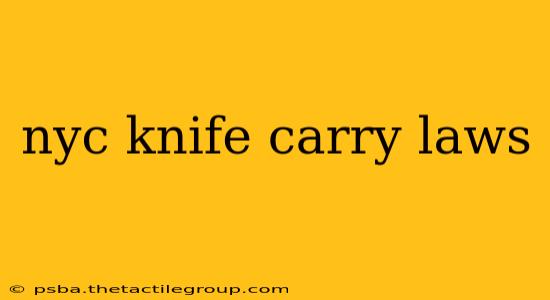New York City has some of the strictest knife laws in the country. Understanding these regulations is crucial to avoid legal trouble, whether you're a resident or just visiting. This guide will break down the complexities of NYC knife carry laws, clarifying what's permitted and what's prohibited. We'll cover different types of knives, legal defenses, and the potential penalties for violations.
What Kinds of Knives Are Legal to Carry in NYC?
The legality of carrying a knife in NYC hinges largely on its design and intended purpose. The key distinction is between knives deemed "illegal" and those considered "legal" for everyday carry.
Legal Knives in NYC:
- Pocketknives: Generally, pocketknives with blades under four inches are legal to carry. However, the overall design and context are important. A small, simple pocketknife intended for everyday use like opening packages is usually acceptable.
- Folding Knives: Similar to pocketknives, folding knives with blades under four inches are typically legal. Again, the appearance and perceived purpose are relevant factors.
- Certain Multi-Tools: Multi-tools containing knives (like Leatherman tools) are generally permitted, provided the knife blade is under the four-inch limit.
- Knives with Specific Purposes: Knives used for legitimate purposes, such as hunting (with appropriate licensing and outside city limits), fishing, or other specialized activities, may be legal under specific circumstances.
Illegal Knives in NYC:
- Gravity Knives: These knives open automatically by gravity or centrifugal force. They are strictly prohibited.
- Switchblades: These knives open with a button, switch, or other mechanism. Possession is illegal.
- Balistic Knives: Knives that fire a blade are absolutely illegal.
- Knives with Blades Over Four Inches: While there isn't a blanket four-inch blade length restriction, exceeding this length significantly increases the risk of legal issues. The longer the blade, the more likely it will be considered a weapon.
- Any Knife Carried with Intent to Use as a Weapon: This is a critical point. Even a legal knife can become illegal if carried with the intent to use it as a weapon. This is judged based on the surrounding circumstances.
Legal Defenses for Knife Possession in NYC
Even if you're carrying a knife that might technically be illegal, you might have a legal defense. These defenses are often complex and require legal expertise. It's best to consult with a lawyer if you face charges. Some potential defenses include:
- Possession for a Lawful Purpose: Demonstrating that the knife was carried for a legitimate, non-violent purpose, like work or outdoor recreation, is crucial.
- Lack of Intent to Use as a Weapon: Showing that the knife was carried without any intention of using it as a weapon can be a strong defense.
Penalties for Illegal Knife Possession in NYC
Penalties for illegal knife possession in NYC vary depending on the specific knife and circumstances. They can include:
- Fines: Significant monetary fines can be levied.
- Jail Time: In some cases, especially with repeat offenses or possession of particularly dangerous knives, jail time is a possibility.
- Criminal Record: A conviction can result in a criminal record, impacting future employment, housing, and travel.
Tips for Safe and Legal Knife Carry in NYC
- Stick to Smaller, More Discreet Knives: If you need to carry a knife, opt for a smaller folding knife with a blade under four inches.
- Carry in a Secure Manner: Avoid carrying a knife in a way that suggests it's a weapon.
- Understand Context Matters: Where you are carrying the knife and what you’re doing can significantly influence whether your possession is considered legal or illegal.
- Know the Law: Familiarize yourself with the specific details of NYC knife laws. This guide offers a good starting point, but it's not a substitute for legal advice.
- When in Doubt, Leave it Out: If you're uncertain about the legality of carrying a particular knife, it’s best to err on the side of caution and leave it at home.
Disclaimer: This information is intended for educational purposes only and should not be considered legal advice. Always consult with a qualified attorney for advice concerning specific legal situations. The laws surrounding knife possession are constantly evolving; this guide is current to the best of our knowledge at the time of writing.

